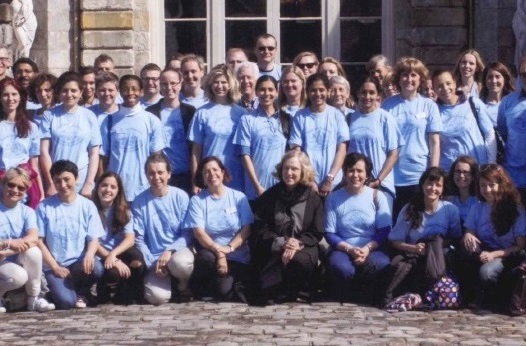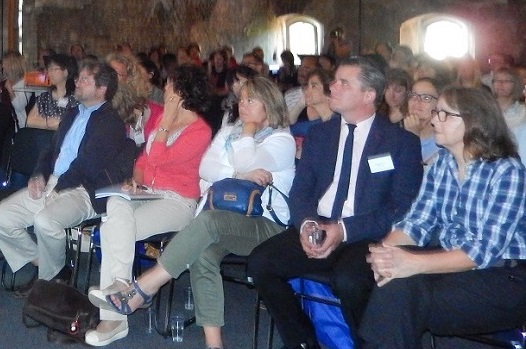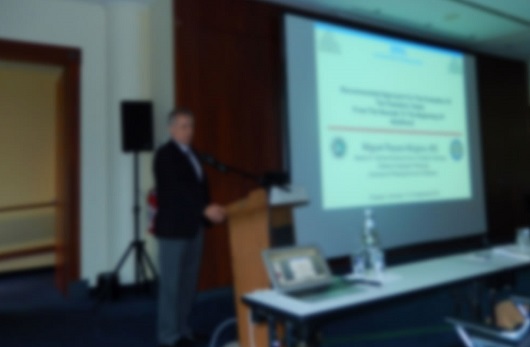IPPA Constitution
As adopted in Jerusalem in September 1978 and amended in September 1984 at Miami Beach, in September 1990 in Buenos Aires, in October 1998 in Nice, in October 2006 in Montreal, in October 2008 in Athens and in September 2016 in Cologne
Last updated 26th September 2016
NAME:
This association shall be called the INTERNATIONAL PAEDIATRIC PATHOLOGY ASSOCIATION
OBJECTIVES:
2.1 The primary objective of the association is to facilitate an increase in knowledge of diseases of the embryo, fetus, neonate and child throughout the world, and its application to the health needs of all countries. This will be carried out through:
2.1.1 Facilitating contact between any persons or groups already working with our objectives.
2.1.2 Assisting any such group of persons with the aid of speakers or educational and scientific material.
2.1.3 Organizing conferences or teaching programs in conjunction with any organization anywhere in the world or, if necessary, organizing such activities independently.
2.1.4 Making any publications, either in combination with other organizations or independently, as may be needed.
ORGANIZATION AND MANAGEMENT:
3.1 Membership:
3.1.1 Membership is open to any person with a major pathology and/or medical laboratory interest in diseases of the embryo, fetus, neonate or child.
3.1.2 Membership can be direct, on an affiliated basis, or indirect through membership of a local society affiliated to this association. Affiliated Societies paying capitation fees are designated as Constituent Societies by Council. No application for direct membership will be considered for any person working in any area where a Constituent Society exists.
3.1.3 Where a regional Constituent Society has a mechanism for creating emeritus, retired or honorary membership, such members will have similar membership of these associations at the discretion of the Council.
3.1.4 Direct and indirect members will have equal voting and other rights. (Direct members will be notified of the Association’s activities personally, whereas indirect members will be notified through the organizing of their local constituent paediatric pathology society.)
3.1.5 Direct membership of the Association is open to any person by written nomination of any two members. Nominations will be scrutinized by the Council and submitted to a general meeting.
3.2 Administration, Officers, and Transaction of Business:
3.2.1 The Association shall have a Council consisting of:
- a) Officers
- b) Representatives of Constituent Societies
- c) Up to eight ordinary elected members who hold office for four years and may only be re-elected after an interval of two years.
3.2.2 The officers of the Association will be as follows:
- a) President, who holds office for two years and presides over public, general and business meetings of the Association. The president is not eligible for re-election to the same office. It is the role of the president to uphold the good name of the Association, to negotiate with other organizations and to guide the Council in matters of policy.
- b) Chairman of Council (also referred to as Secretary/Chairman), who holds office for six years, presides over meetings of the Council and as the leader of the Council has the role of coordinating the various working activities of the Association and in bringing about equitable representation and participation by the Constituent Societies and their representatives. He/she also serves as the central coordinator of all activities for the Association and communicates with the officers of Constituent Societies. The Chairman of Council shall submit a report to members at least once every two years. The Chairman is not eligible for re-election to this office.
- c) Treasurer, who holds office for six years, is responsible for collecting and administering the funds of the Association. He/she will submit a biennial budget and make a report on the financial status of the Association to Council and the members of the Association. The treasurer is not eligible for immediate re-election to the same office.
- d) President-elect will hold office for two years preceding his/her assumption of the office of president.
- e) Past President will continue to hold office as a member of Council for two years after ceasing to be president.
- f) Chairman-elect will hold office for two years preceding his/her assumption of the office of Chairman.
3.2.3 Two representatives of the Constituent Societies will be elected and serve for periods on the Council as their Constituent Society may determine. It is, however, deemed appropriate that the secretary of a Constituent Society should whenever practical be one of the two representatives of that society. The names of these representatives must be conveyed to the Chairman of the Council at least two months before a biennial meeting and whenever a change is made by the Society.
3.2.4 The additional ordinary members should be elected at a biennial general business meeting to give as wide a geographic distribution and of interests as possible on the Council.
3.2.5 The Council may appoint Boards of Committees with assistant secretaries and/or Conveners (who need not be members of Council) for specific purposes (such as liaison with other organizations, to arrange meetings or to perform specific administrative or investigative tasks) as may be deemed appropriate for a duration of no more than four years, after which reappointment by Council for another four year term is permitted. The election of secretaries to liaise with other organizations should be done after consultation with officers of that organization. Examples of such boards and/or committees are: Publications Board and Committee for Advanced Courses.
3.2.6 The IPPA Course Committee is a permanent committee of the IPPA Council, whose function is to oversee the running of the Course and appoint the Course Director. The Director is accountable to the IPPA Course Committee. The committee consists of the following members:
- IPPA Course Director (5 years)
- IPPA Past President (term of office)
- IPPA President-Elect (term of office)
- IPPA Resident Tutor (5 years)
- IPPA Director of Educational Technology (5 years)
- IPPA Chairman of Council (term of office): Chair of the committee
- IPPA Treasurer (term of office)
- Representative of IPPA graduates (4 years)
- IPPA President (term of office)
3.2.3 Two representatives of the Constituent Societies will be elected and serve for periods on the Council as their Constituent Society may determine. It is, however, deemed appropriate that the secretary of a Constituent Society should whenever practical be one of the two representatives of that society. The names of these representatives must be conveyed to the Chairman of the Council at least two months before a biennial meeting and whenever a change is made by the Society.
3.2.8 Council shall meet at least once in every two years.
3.2.9 Extra-ordinary meetings of Council may be called by the chairman at any time at the written request of four members of Council.
3.2.10 There will be an Executive Committee of five members consisting of President, Past-President, Chairman of Council, Treasurer and President- Elect to deal with such business as may arise from time to time and which cannot be deferred until the next meeting of Council.
3.2.11 Officers and Council members may not receive a salary from the Association.
4. ELECTION PROCEDURES:
4.1 The offices of President, Chairman of Council, and Treasurer are to be elected by those members attending a biennial public business meeting, after receiving the nomination from the Nominations Committee. The Nominations Committee is to consist of the President of the Association and the President (or representative) of each of the other affiliated societies.
4.2 The members who attend the biennial public business meeting, however, may elect a person other than the choice of the Nominations Committee.
4.3 Officers and additional members of Council will be elected by a simple majority at the biennial public business meeting. In the event of a voting deadlock the President (or Chair of the meeting) will have the deciding vote.
5. QUORUMS:
5.1 For public business meetings of the Association, eight members will constitute a quorum.
5.2 For meetings of Council, four members will constitute a quorum provided that the affiliation of those councilors present covers more than one Constituent Society and that at least one member present is an Executive Officer (Chairman of Council, President, or Treasurer).
5.3 For meetings of the Executive Committee, three members will constitute a quorum. If there is any business which requires a vote to be taken, it is expected that the views of all other members of the Executive Committee will be obtained by electronic means (telephone, teleconference, facsimile or E-mail, whichever is most appropriate).
5.4 In emergency circumstances, and only with the agreement of all members of the Executive Committee, the Chairman of Council may seek the views of members of the Executive Committee by electronic means to determine a response to any matter where a physical meeting is unable to be achieved.
6. MEMBERSHIP FEES:
6.1 The Council recommends subscription rates for direct and indirect membership to a general meeting. Changes in these rates require a simple majority approval at a general business meeting.
7. GENERAL MEETINGS:
7.1 A general meeting may be called at any time but at least every two years and, unless otherwise specified, will take place at the time of the biennial meeting of the International Academy of Pathology.
8. HONOARY FELLOWS:
8.1 The Association may invite to honorary fellowship up to twelve living persons who have made major contributions to paediatric pathology.
9. LANGUAGES:
9.1 The general business of the Association will be conducted in English. Individual meetings may be held in other languages at the discretion of the President.
10. CHANGES TO THE CONSTITUTION:
10.1 Changes to the constitution can be made on the recommendation of the Council by a majority vote at a designated general meeting, the proposed changes having previously been communicated to the direct members and secretaries of linked societies two months prior to the general meeting.
11. DISSOLUTION:
11.1 If at any time the Association ceases to function and does not hold a meeting for five years, any assets that the Association may hold will be presented to the World Health Organization.
Last updated 26th September 2016



